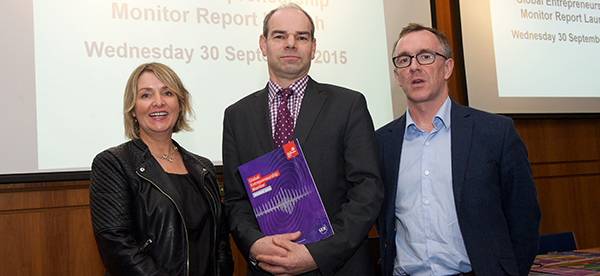Family business background doubles chance of starting your own business: Global Entrepreneurship Monitor

People in Scotland with a family business background are more likely to feel they have the skills to start a business, are more likely to see opportunities for creating one, and are less likely to fear failure.
People who worked in a firm owned by a parent are twice as likely to be trying to start one of their own, or running their own new business, than those with no family business background.
The Global Entrepreneurship Monitor (GEM) 2014 survey found that family businesses are prolific incubators of spin-off companies – with 25% of early-stage business entrepreneurs reporting their company was developed from an existing business controlled with their family. These family spinouts are also better resourced and more likely to be growth-oriented than other fledgling businesses.
University of Strathclyde Business Enterprise graduate Jennifer Hope is one of the people behind the statistics. After graduating in 2013, Jennifer spun out “The Wee House Company” from her father’s construction business and she has just won the Association of Scottish Businesswomen’s ‘Young Inspiring Businesswoman’ Award for 2015.
Professor Jonathan Levie of the University of Strathclyde’s Hunter Centre for Entrepreneurship, author of the report, said, “The GEM findings demonstrate that people who grow up in a family business don’t wait around to take over the reins, but are twice as likely as other people to start a new business from scratch.
“Often the new business is a way for them to prove themselves as future family business leaders, but their new business can sometimes save the family firm by reinventing it. It just shows family businesses can be dynamic – and how business families can be entrepreneurial.”
The report also found:
- Opportunity perception and skills self-perception in Scotland rose significantly in 2014, but fear of failure remained high.
- The Scottish Total Early-Stage Entrepreneurial Activity (TEA) rate at 5.5% was between the third and fourth quartile of innovation-driven countries in 2014, with similar rates to other Arc of Prosperity countries but significantly below the UK rate of 8.6%. The subdued rate for Scotland may have been affected by the timing of the survey, which was in the two months preceding the independence referendum. The longer term trend suggests that early-stage entrepreneurial activity rates across the UK remain higher than rates before the great recession.
- Edinburgh and remote rural local authority areas tend to have high TEA rates while local authority areas west of Glasgow have the lowest rates. In part, this reflects Scotland’s industrial heritage, with former heavy industrial and mining regions showing less favourable attitude, intention and activity rates. The capital city and remote rural areas show the most positive mix of entrepreneurial attributes and activity.
- Perceptions of availability of external business start-up funding seem to have improved since the great recession in Scotland (though not in England), and frequency of informal investment has increased, but the median investment in start-ups has declined. This is partly a consequence of changing sources of funds but also possibly lower start-up costs.
- Many of the attributes that distinguish early-stage entrepreneurs from others are not easily altered by government policy: attributes like age, gender, household income, education level, migrant status and family business background. But significant attributes that policy might be able to influence are knowing a start-up entrepreneur, perceiving opportunities, and perceived media reporting of successful new businesses.